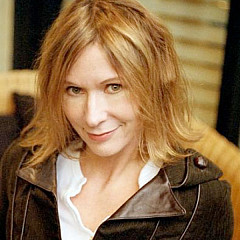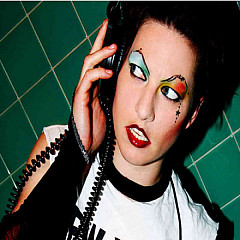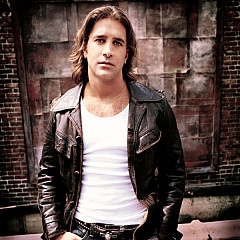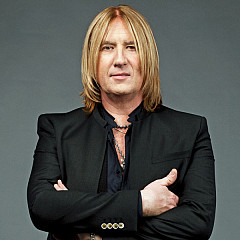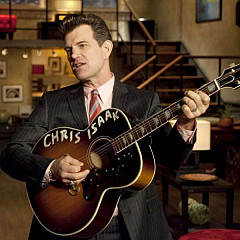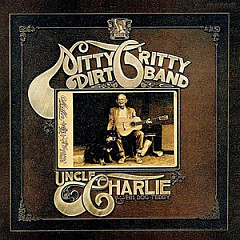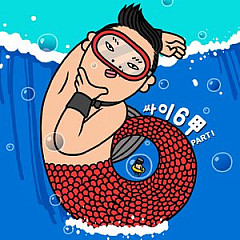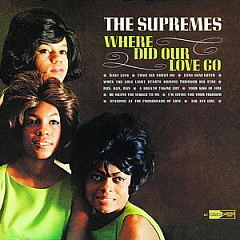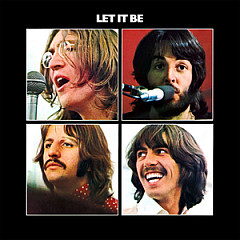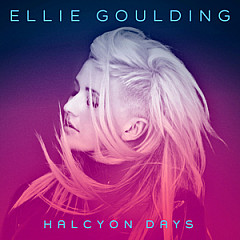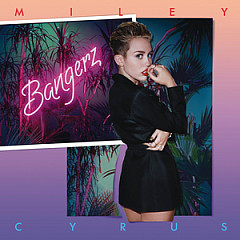
Marvin played bass in the musical supernova Lone Justice, a country-punk band fronted with gale force by a teenaged Maria McKee, who formed the band with guitarist Ryan Hedgcock. As a live act, the group was a sensation: Stevie Nicks, Don Henley and Dolly Parton all showed up to gigs. Marvin convinced the band to write their own songs, and he came up with gems like "You Are the Light," "East of Eden" and "Soap, Soup and Salvation" (written with McKee) for their 1985 debut album, produced by Jimmy Iovine. A B-side from this era, "Go Away Little Boy," was recorded with the band by the man who wrote it, Bob Dylan. As Marvin explains, Dylan doesn't tell you what the chords are.
Tampered by refinement, Lone Justice made just one more album before breaking up in 1986. To the horror of fans, McKee went mainstream, scoring a #1 UK hit in 1990 with the ballad "Show Me Heaven" from the Days of Thunder soundtrack.
Marvin became "The Mandolin Man" for his 1992 solo album, and had continued success as a songwriter ("Can't Cry Hard Enough" was recorded by Judy Collins, Victoria Williams, Julie Miller and Susan Ashton) and as a producer (Toad the Wet Sprocket's Pale, Peter Case's Sings like Hell). In 1993, he and Lone Justice drummer Don Heffington backed McKee on her solo album You Gotta Sin to Get Saved and the subsequent tour.
On his 2012 2-CD collection Marvin Country!, Marvin is joined by McKee, along with Lucinda Williams, Steve Earle and The Dixie Hummingbirds. We asked him about making the album, and floated the possibility of a Lone Justice reunion.
 Dan MacIntosh (Songfacts): I wanted to start by talking about the new album. The title of the album, does it have to do with the musical style country or is it just sort of a play on your state there, Marvin Country?
Dan MacIntosh (Songfacts): I wanted to start by talking about the new album. The title of the album, does it have to do with the musical style country or is it just sort of a play on your state there, Marvin Country? Marvin Etzioni: I'd probably check all the above. It came from my friend, Steven Fishell, one of the musicians on the record, pedal steel player. At the time, in the late '80s, he was still living in LA. He called one day and says, "I'm moving to Nashville." I said, "Before you leave, I was thinking about doing something called Marvin Country." He goes, "I love it. Let's do a show." So we put together a show and we played at the Palomino. And then he left to Nashville, with other people I knew, as well.
That was the early stages. I always kept the concept. So I just kept going with it.
Songfacts: And how did it get expanded to a 2-CD set?
Marvin: I just had to stop the wheels from going. At the end of last year I had about four albums worth of material, and I just said, "Okay, I think we've got to stop." (Laughs) So we narrowed it down to two. That's where it landed. It wasn't really by any kind of design. It wasn't like I started the record years ago and said, Oh, I want to do a double album. It just kind of kept evolving to where it landed.
Songfacts: How long did it take you to complete the album?
Marvin: It was probably over 20 years. (Laughing) It wasn't like 20 years ago I woke up one day and said, "I'm going to do this double album." It wasn't really like that. I did some recordings and initially it was going to be a single disc, and then I had actually made a cassette only version of the record like 15, 20 years ago, and handed that out. There was a label that was going to put it out, but then the label folded. So it was kind of a series of events, like a car that's about to go, then it stops, the battery dies, a new battery, "We're going." It stops again. It was like this thing that just kept wanting to go, and then finally over the years as I was doing other things - what is that line, "A record happens while you're busy doing other things." (Laughing)
Songfacts: Nicely put. Did you always envision it as being a special guest kind of a thing?
Marvin: Not really. On the original one I think I had just Buddy Miller on it. And then I recorded "You Possess Me." I called Maria [McKee], and she said, "Oh, I love that song." I said, "Well, it's all done." It was ready to go. And then when she added her vocals, it was like, Okay, this is a lot better with her than with me alone. Just one of those magical moments when she walked in the studio. It took us longer to drive to the studio than for her to record her vocal.
Same thing, the Lucinda vocal is completely different. It was a real different experience. I flew to Nashville with the two inch tapes, and we cut that vocal live to the track that was already existing. So that song took a long, long time for me to finish. I was really going for something, but it just took a long time.
So no, it did not start out the way that it ended up at all. But once I realized I had all these pieces to the puzzle and I put them together and I looked at it or listened to it, I kind of accepted it for what it was.
Songfacts: Were there any particular songs that you had the most fun doing?
Marvin: "Living Like a Hobo" was really fun. It's a deceiving record, because it's very spontaneous sounding, but it actually started with just me and Don Heffington, electric guitar, live vocal, and drums. And then we built on that. I always make sure that anything like that was like the first take. I really wanted that spirit, like the train was about to lose control at any moment. And then Buddy [Miller] added the vocal, and then that was it.
Songfacts: Have you heard the new duet album, Buddy Miller and Jim Lauderdale?
Marvin: You know what, it's funny you mention that. Because the last time I was in Nashville, I was on their radio show and they were talking about that. And then I saw them play in Nashville at the Ryman, and they played a song from the album and it sounded really good.
Songfacts: Yeah. There's one song, I think it's called "I Lost My Job of Loving You."
Songfacts: No kidding. It's sort of a recession love song. And it's the first one I've really heard that plays on that whole idea. It's very well done.
Marvin: Yeah. I'm sure the album will get them a lot of attention.
Songfacts: One of the things I noticed, kind of a running theme on your album, is that there are a lot of songs written about musical heroes. There's "Bob Dylan is Dead," there's "Gram Revisited," there's "What's Patsy Cline Doing These Days," part 1 and part 2. Is that coincidental that those just happened to end up on there?
Marvin: Pretty much. "Bob Dylan is Dead," I started writing that song in the '80s. It's not like I follow magazine reviews of artists, but there was this one review of Dylan that came out in the '80s of one of his albums. And they just really tore it to shreds. I thought, you know what, God forbid if anything should happen to Dylan. Whoever wrote that article would not want to be remembered writing that. I mean, he just accomplished so much. Who cares if this album's not your favorite, you know? It might be in 20 years. He's that kind of guy, he's that kind of artist.
So that was really the beginning of "Dylan." And I thought, well, I want to record it in kind of a unique way. So I called up a friend of mine who sings in a choir and I said, "Let's do mandolin and choir." And she says, "Great." So she helped put that together. And my friend Willie [Aron] co-produced that one with me. So we just cut that live in the studio.
Songfacts: Have you ever worked with Dylan?
Marvin: Yeah. I got to record with him during Lone Justice. He wrote a song for the group called "Go Away Little Boy." It was really a memorable day. It was Dylan, Ron Wood from the Stones on lead, and Heffington from Justice. Benmont Tench was on organ and piano, and then I was on bass. I was literally five feet away from him, just watching his hands. Because he doesn't tell you what the chords are - no discussion about anything. As soon as you set up and you're plugged in, you're pushing record, and you're on. And that's what we did. It was great.
I ran into him a couple of times since then. It's always nice running into him and talking about stuff.
Songfacts: What was the inspiration for the "Patsy Cline" song, which is kind of a funny song, too.
Marvin: Yeah. The "Patsy Cline" song was based on a true story that there was a head of a label, and apparently he walked into a record company meeting wanting to break a new artist. And he said, "We really should have this guy sing with someone." And he said, "What's Patsy Cline doing these days?" And I go, "Oh, my God, this is incredible." And so that's where the song came from. [Patsy Cline died in 1963]
And I didn't realize that it was kind of foreshadowing the rise and fall of the record industry as we know it. (Laughing)
Songfacts: It kind of reminds me of "Which one is Pink," the old Pink Floyd story.
Marvin: Oh, yeah. Exactly. So I should have said, "Based on a true story." But it was based on a true story, without giving names away. I don't think I could have made that one up.
Songfacts: In doing research for our talk, it's amazing what you can find on the Internet, and I was going on Youtube and seeing how many different artists have covered "I Can't Cry Hard Enough." Which is such a wonderful song.
Marvin: Well, thank you.
Marvin: Correct.
Songfacts: And she said, "It's a lovely song, it's a David Williams song." And didn't even mention you. And I thought, Man, that's just not right. Tell me about writing that song.
Marvin: Well, maybe she got the song from David. I don't really know where she heard it, but I didn't take that personally. In fact, I had seen her live and she did mention me. So that stuff happens. That's no big deal. And, in fact, an artist that I produce from Grand Rapids, Michigan, a guy named Ralston Bowles, she released his first two albums that I produced. So I don't hold anything against her on something that's said on a talk show. When you're doing TV and radio, you're not always 100% detailed. The fact that she mentioned anybody is pretty great. (Laughing)
But writing the song was like a magical moment. David, his brother Andrew and I, we were all writing songs for their [The Williams Brothers] second record. And so David said, "Hey, why don't you just stay over tonight." He was house-sitting. And I said, "Great." And so I stayed over and in the morning he said, "Hey, I've got an idea for something." He played me the opening line and the piano chords to what started the song. And I said, "Hold on a second." And I literally just wrote on a piece of paper the lyrics. And I said, "Hey, I think I've got something. It's called 'Can't Cry Hard Enough.'" He goes, "Okay, that sounds good." And so I said, "You play and I'll sing what I've written, and then we'll kind of piece it together." And really it just kind of fell into the room. That was it.
What was funny is that his brother and Victoria Williams showed up about an hour later and we said, "Hey, we've got this new song." And I thought it was good, but it didn't hit me one way or the other. I thought, Okay, here's another song. We played it for them, they were like, You mean if we were here an hour earlier we would have been co-writers? I guess so. But it's done. So that was it. It was kind of a gift, really.
Songfacts: Well, it's interesting, because when I hear that song, I think, Man, something must have really happened to inspire it. But to hear you tell it, it doesn't sound like it was based on much.
Marvin: Well, I mean, there were things going on. I'd lost my grandmother, and so it's a subject matter that I connect with. It wasn't disconnected. I mean, there are stories of songs that take a really long time, or "We had the track first and then we built..." it doesn't really have that kind of story. It was one of those songs that just came into the room and fell together in an extraordinary way.
Songfacts: At the risk of sounding like the guy commenting on Patsy Cline, the Williams Brothers, I saw them open for Suzanne Vega out here at the Wiltern and they were wonderful. But I haven't really heard from them. What are they doing?
Marvin: Well, we did "Can't Cry." David Kirshenbaum he produced the "Can't Cry" single and most of that album. And then the follow up album was called Harmony Hotel, and it was unfortunate for them. But my understanding was that Warner Brothers was going through a regime change when that album was coming out. And they fell through the cracks. And then I think they both threw in their towels as the Williams Brothers after that.
We did try one more set of recordings. We went in and cut like 4 or 5 songs with a live band. They were going to do something more country influenced - we cut it with pedal steel. But they actually had interest from a label in Nashville and they said, you know what, we're not going to even go. Like, okay. That was it. That was kind of the end of the Williams Brothers. So I saw the rise and fall of the Williams Brothers.
Songfacts: But are they making music individually?
Marvin: Andrew seems to be more interested in producing. And David I believe is writing. But I haven't worked with them in quite a while now.
Songfacts: On your new album you do "You Are the Light," which was a Lone Justice song, which you did with the Dixie Hummingbirds, which makes so much sense, because really it's a gospel song.
Marvin: Well, that was another song where I was going for a dark night of the soul, so to speak. I was living on my grandparents' couch. I just had the house to myself one day, and I wrote that song. And that was it. It just kind of came in the room.
I wrote it on acoustic, and I wanted it to be kind of Rubber Soul-like. And I liked the Lone Justice version. When we first did it, we did it all acoustic. That was how I originally envisioned it. I had a band that did it on the record, that was a good version, too.
But on this version, it was accidental. Trevor Lawrence Jr. is a drummer in LA, and I'd worked with him. Amazing drummer, he's worked with Snoop Dogg and Stevie Wonder, all these people. We were spending a bit of time together playing, and one day I was talking to him and he says, "Are you going to the Grammys tonight?" And I said, "No." He says, "Oh, I'm going with my grandfather." I said, "Who goes to the Grammys with their grandfather?" He says, "Oh, my grandfather is Ira Tucker, he's in the Dixie Hummingbirds." I go, "That's incredible. I love the Dixie Hummingbirds." I said, "I have a song that would really work well for them." And he goes, "Oh, they only do gospel music." I said, "Well, I think it could work." He said, "Okay. Here's his number."
He goes, "Yeah, send me the song." And so I sent it to him - he lived in Philly. I waited a month, I waited five weeks. Finally after a while I called him back. I'm thinking, Oh, boy, maybe he didn't like the song. And he goes, "Hey, man, where you been? We already have the whole arrangement ready to go. We thought you didn't want us to do it anymore." "No."
They were still doing dates with Paul Simon, because they sang on "Loves Me Like a Rock." So I sent them the files. I was not in the studio when they cut that. And, in fact, I never had the intention of releasing that song for the album. But what had happened was the version I cut, the guitar and vocal, I sent that as a birthday gift to someone. And she goes, "Oh, you've got to put this on your record." Then I was talking to the grandson, Trevor, and then that happened. So the whole thing kind of took a life of its own. Had I thought about it more, I would have arranged it different. You know, it doesn't have a solo, it doesn't have a key change like the Lone Justice version. But it is what it is. It still says the song.
Songfacts: So when you think back on especially that first Lone Justice album, some of those songs, what was it like? Because I notice you write with Maria and you write with some other folks in the band. What was the experience like?
Marvin: Well, as a songwriter, I wrote "You Are the Light" alone, I wrote "East of Eden" alone. I had that song before there was a Lone Justice. That song was written years before Lone Justice. And I wrote "Working Late" alone. It's funny, a lot of people thought that Maria wrote "Working Late" because it comes from her point of view. I remember when we did the interview for the LA Times for the first album, and I was called up and he asked me what songs I wrote and I mentioned the titles that I gave you. And he says, "Well, you didn't write 'You Are the Light.'" I go, "I don't know why you say that. I did. You can ask anybody. Why do you say that?" He goes, "Well, Maria wrote that, she's Born Again." And I was like, "Okay, so Jewish kids don't write songs? I don't know what to tell you."
Songfacts: That person hadn't read the Psalms and some of the things that David had written, apparently, huh?
Marvin: I guess not. I don't know. It was kind of a funny comment. But that happens.
So the experience of songwriting for the songs that I wrote, I pretty much walked in and the songs that appear on the record, that was pretty much the song. They were done. I remember when Maria was working on "Soap, Soup, and Salvation." I just kind of helped out a bit. That was before the first album. But it was really her song. You know, "Don't Toss This Away" we cut way before the first album. I was involved in arrangement and making sure we had the right band arrangement, but that was Bryan MacLean's song. So I think I was helpful in terms of helping to create a band sound on the songs early on.
Some of the later songs kind of came in, and the first album I think took too much time to make. It was going in a direction that didn't necessarily reflect this little live band anymore. So by the time the album was done, I think so was the band.
Songfacts: Have you ever been approached to do a reunion Lone Justice thing at all?
Marvin: You mean by people outside of the band?
Songfacts: Yeah.
Marvin: Oh, yeah. The band has been offered record deals to get back together. And at the time Maria had no interest. So people were offering carte blanche, as much studio time as you want. You guys never got to make the record you wanted to make. There were some real fans out there who were willing to do anything to see it come back to life. But at the time Maria didn't want to entertain it. So we remain friends as friends.
For whatever reason, it's probably easier for me, Ryan and Don to get together. If Maria wanted to do that, then she could do that, if everybody wanted to get in the room together. It would be fine with me, because I like playing music. And to me what we were doing 25+ years ago is completely contemporary right now.
Songfacts: Right. You guys were so ahead of your time.
Marvin: Well, that's not really for me to say. But it seems that if we did the set that we were playing in 1983, '84, and played it now, it'd be like, Okay, that was a good night. It would be fine right now.
Songfacts: I can remember even before the first album came out there was all kinds of talk about like Dolly Parton going to your shows. It was just a really exciting time. Was it just overwhelming?
Marvin: I can't really speak for Maria about it. One of the differences between me and Maria, and I think one of the reasons that I was really more interested in being more of an arranger, catalyst or mentor or something, I'd already gone through the cycle in a previous band incarnation by the time I got to Lone Justice. So I had already gone through it. I'd worked with Chuck Plotkin, Springsteen's producer, for a while, and the album never came out. I'd already gone through this cycle of working with a producer, it didn't work, now I know how to do it right. So I applied what I thought I learned from working with other producers in the past to early Lone Justice. When I met Maria, she was 18. So the whole thing had a real pure, innocent spirit about it.
I remember the night Dolly was there. She was really great. She came up to me at the end of the night and she goes, "Did you write 'Working Late'?" And I said, "Yes, I did." And obviously I can't say it's not influenced by Dolly Parton. She's somewhere in there, I suppose. And she says, "Well, I want to record that song." And I said, "That's great." And she said, "But you can't do it anymore in Lone Justice." I said, "Well, I think it's going to be on our first album whenever we do an album." And she goes, "Okay. Well, I'm not going to record it, then." I said, "Okay."
I never told the band that, because I never wanted to have Maria think, Gee, you can have Dolly Parton do your song instead of us. The same thing happened when Susanna Hoffs called. She wanted to record "East of Eden" for the album the Bangles were working on. And I said, "We're going to probably do that for Lone Justice." "Okay, bye."
Before Lone Justice I was playing solo acoustic, and that was not the most popular thing to be doing in 1982 in LA. I was playing a solo acoustic gig opening up for the Bangles before they were signed. I thought they were fantastic. All of a sudden, they come out for a sound check and they're playing "No Matter What" by Badfinger, with no makeup, and just loud guitars and great harmonies. It was like, this is fantastic. So we all hit it off at that time. And that was before they had Vicki playing bass. I must have played "East of Eden" at night as a solo acoustic. So I kept in touch with Susanna.
So yeah, it was helpful for me that I had already gone through this cycle once before. Certain things that I had problems with, by the time I wanted to fix it, it couldn't be fixed, but the early days were really fun. I think the most fun was just whether it was at a rehearsal hall or playing some of the early gigs, it had a real innocent fire to it. The first album became more calculated, it wasn't as interesting to me, and I had a different vision for the second album. I wasn't that interested in '80s music. I didn't really like '80s music back then. It still doesn't sound that good to me.
It's difficult - our instincts were that we were a 21st Century country band in the early '80s. If that band got together right now, it would be fine. But at that time, when the machine entered this thing, all of a sudden you're in the timeframe, you're in context of, Oh, Madonna's really big. It's like, well, I didn't care about Madonna in 1985. I didn't listen to her then, I don't listen to her now. I remember going into the studio once on an early Lone Justice recording and I told the engineer, "You know that sound on MTV where the snare drum is really big and all the bands are using it?" "Oh, yeah, I know how to get that sound." I said, "Well, just do the opposite. Don't do that at all. Take all the effects off and just the sound of the microphones on a snare." But that was like not an easy thing to achieve back then.
Songfacts: It's funny, my music listening kind of went in the same direction that you did. That's when I really started to discover country music and roots music, because I wanted the opposite of what was on MTV. So it was actually a good thing, because I just gravitated to the opposite of what I heard all over radio and I found great stuff.
Marvin: Yeah, there are some classic songs that made it through - like "Every Breath You Take" and "Purple Rain" - but the overall feeling at the time, it was very, very heavy handed. So the machine was heavy handed, as well.
Without getting into too many details, it didn't work. But what's important is that the music stands. I think that initially, as an artistic band that made a statement, the band was right for what it was doing. I'll really stand behind the concept of the band and some of the really early things that we were doing. To this day, people still refer to "You Are the Light" as a key song in their lives from weddings to funerals. In fact, I got a call from someone, you should check this book out, it's really good. This woman in Canada [Katrina Onstad] wrote a book, it just came out, it's called Everybody Has Everything. And the main character in the book, her favorite song is "You Are the Light." And it's a thread that runs throughout the whole book.
Songfacts: How cool is that?
Marvin: It's pretty amazing. It was beyond. When I played in Canada recently in Toronto, I got to meet the woman. It was great. So to this day those songs, I feel like they still have a life and it's part of people's memory banks. It wasn't by design that I put out the new version of "You Are the Light," but once I heard the Dixie Hummingbirds on there, it was like, Oh, come on, this is ridiculous. We've got to put this on the record. I couldn't even believe it when the tracks came back.
Songfacts: If you can't reform Lone Justice, do you think you can get Maria to make another country oriented album?
Marvin: You mean me, personally?
Songfacts: Well, you know, you have influence.
Marvin: I don't know about that. Like I say, we're friends and she knows what I'm doing. I sent her a copy of the record and she was kind to be on there. I can't predict the future, but if she wants to get together and play, great. If she wants to go out and just have dinner and hang out and talk about stuff, that's fine, too. It really is. I don't know how else to approach it. It's like she's family. You've just got to accept where each family member's at. I have a sister who lives in Montclair, New Jersey. I'd like her to move back to LA so I could see her more often and see my nephew more often, but that's where their life is.
Songfacts: For a while you went by the name The Mandolin Man. Is that a persona that you no longer go by?
Marvin: I named the first album that, and it's kind of the right thing. I've been playing gigs with mandolin and string quartet, or I just play solo mandolin. So I'll still play the song "The Mandolin Man" from that. I'm not specifically saying to people, "You have to book me as The Mandolin Man." But a few people know that I play mandolin, so that's all right.
Songfacts: You do so many things so well. You're a musician, producer, songwriter, singer. What do you like to do best?
Marvin: Oh, I don't know. I like being a father to my kids.
Songfacts: That's the way to get out of answering the question.
Marvin: It's like asking which one of your senses you prefer, because they're always on. But the one that really makes me tick is songwriting. I still wake up, it's like there's a song I dreamt about, there's a song I've got to write. It's always been about the song, even with Justice. When I first met Maria and Ryan they were doing all cover songs. I said, "You guys are great, the two of you singing together. But if you don't do original material, I don't think I'd be that interested." I said, "We've got to get some originals in here to take it to the next level, otherwise it's just another honky tonk band singing Hank Williams songs." I always wanted to add an original point of view to it. So that's when the songs started to come through.
So I would say songwriting. Because without songs, you have a blank record, unless you're doing a Brian Eno ambient record or something. So for me records are about songs.
February 7, 2013. Get more at marvincountry.com.
More Songwriter Interviews

